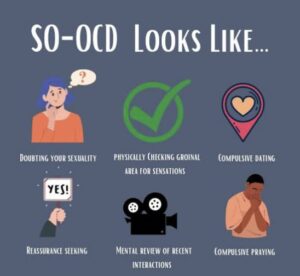
What is Sexual Orientation OCD/SO-OCD?
Sexual Orientation OCD, is a type of OCD where people faces unwanted thoughts about their sexual orientation. These thoughts are unwanted and can make someone feel unsure about who they’re really attracted to, even if nothing has changed. This can cause a lot of worry and emotional pain.
People with SO-OCD might start to doubt if they really like their partner, or they might feel nervous if they’ve had a passing thought or feeling about someone of the same (or different) gender. They may also be scared of feeling stuck with a certain orientation and worry that they won’t be able to go back to what felt true before.
Symptoms of Sexual Orientation OCD/SO-OCD
Both men and women with Sexual Orientation OCD might show signs like the ones below::
- Distress about one’s sexual identity. People with this type of OCD often keep wondering or worrying if they might not be the sexual orientation they thought they were. They might worry they are a different orientation—like gay or bisexual—even when they aren’t. Since SO-OCD makes them constantly second-guess who they are attracted to, it can lead to a lot of stress, fear, and confusion.
- Ongoing, unwanted thoughts or strong urges that make a person question their own sexual oreintation. People with SO-OCD often get stuck with upsetting thoughts they don’t want, making them question their sexual orientation over and over. For example, they might worry they’re gay even if they aren’t, or they may have upsetting sexual thoughts about someone of the same gender that don’t match how they truly feel.
- People with SO-OCD might avoid certain situations that bring up their fears about their sexual orientation—like dating someone of the opposite gender. They may also repeat certain actions, like constantly taking online quizzes or searching for answers, in an effort to “prove” to themselves what their real orientation is.
If you notice signs of sexual orientation OCD in yourself, it’s a good idea to talk to a mental health expert. Therapy, like cognitive-behavioral therapy (CBT), can teach you ways to handle the unwanted thoughts and stop behaviors that keep you stuck in worry about your sexual identity.
Obsessions of Sexual Orientation OCD/SO-OCD
In sexual orientation OCD, a person might get stuck on thoughts or urges doubting if their real sexual orientation is different from what they believe. They may worry they are actually gay, straight, bisexual, or asexual, even if they’ve always felt sure about who they are. These kinds of thoughts can cause a lot of worry and upset feelings.
Another type of obsession that can happen with sexual orientation OCD is the fear of being attracted to children or people who are not appropriate as sexual partners. These worries can be very upsetting and often lead to repeated actions. For example, a person might spend a lot of time looking online for information about what kinds of sexual relationships are considered acceptable. They might also frequently ask others about their own sexual feelings to try to understand if their thoughts are normal. In addition, they could find themselves engaging in repeated sexual behaviors, like compulsive masturbation, as a way to try to calm their anxious thoughts or doubts.
Compulsions of Sexual Orientation OCD/SO-OCD
A very common behavior in sexual orientation OCD is constantly looking for reassurance from other people about one’s sexual orientation. Those with SO-OCD often feel deep uncertainty about who they are attracted to and try to ease this worry by repeatedly asking others for confirmation. This could mean directly asking friends or family if they think the person is gay or not. Sometimes, it might be less obvious, like carefully watching how others act or looking for clues in their body language to figure out if they are attracted to a certain gender. These repeated actions are done in hopes of calming the person’s anxiety, but they often keep the worries going instead.
Many people who have this condition struggle a lot with being sexual, even with partners they are attracted to, including those of the same gender. This can cause a lot of stress and make it hard to build close relationships or enjoy intimacy. These difficulties can also affect other parts of their life, creating more challenges.
Besides physical actions and avoiding certain situations, people with SO-OCD often have mental habits they repeat to cope with their worries. For example, some may go over their past sexual experiences again and again, trying to figure out if they’re really attracted to a certain gender. Others might have unwanted thoughts about their sexual orientation and try to cancel them out by doing specific mental exercises or routines.
Even though the habits and worries from SO-OCD can feel overwhelming, there are ways to get help that can reduce these symptoms and help you feel more in control of your life again.
You can write to us: info@emotionoflife.in or reach out us via call 9368503416 or visit our website- www.emotionoflife.in
